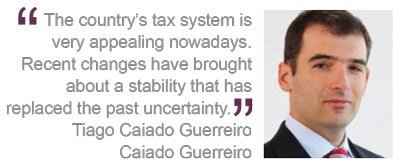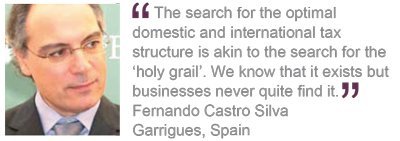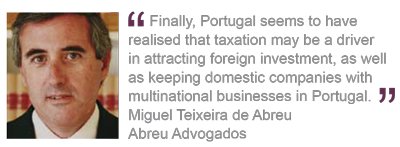Tax Special Report 2014: Taxing times
Under a rain of reforms, Iberia’s tax frameworks are an ongoing ‘work-in-progress’. Their respective governments have been on a drive to attract foreign investment and increase each country’s competitiveness. While some measures have been very welcomed, others are creating even more legal uncertainty. And 2014 looks set to be another challenging year, say lawyers.
It has been all change across Iberia’s tax scene. 2013 was not shy of reforms, and lawyers foresee many more in 2014.
Over the past two years, the Spanish Government continued its drive to increase gross domestic product and reduce public deficit. And tax collection was their weapon of choice.
But while many of the measures they introduce were designed to be short-term and one-off, they have recently been extended to 2014 and 2015. “If we are honest, these are likely to become an increasingly hot topic as the election dates draw closer,” says Isidro del Saz, Tax Partner at Roca Junyent. But as advisers it is becoming increasingly difficult to provide advice in such an unstable legal environment, explains Luis Rodríguez-Ramos, Tax Partner at Ramón y Cajal Abogados, and almost impossible to provide advice on a long-term basis.
Enhancing the country’s competitiveness was top of the Portuguese Government’s agenda this past year. “And the country’s tax system is very appealing nowadays,” says Tiago Caiado Guerreiro, Head of Tax at Caiado Guerreiro. “Recent changes have brought about a stability that has replaced the past uncertainty.”
What is important is the added value this gives to the economy, says Diogo Ortigão Ramos, Head of Tax at Cuatrecasas, Gonçalves Pereira, Portugal. “We have created the conditions to boost our industries, and a capacity for IP and exports.”
Reforming the system
2013’s measures, while good news for Spain’s tax collectors, have been disadvantageous for domestic companies, say lawyers, especially those with an international presence. One of the most significant examples being the abolition of article 12.3 of the Corporate Income Tax (CIT) Law, by which the depreciation of participation in other companies has become non-deductible.
This has a negative effect, as it slows down the internationalisation of Spanish companies in return for short-term tax gains, according to Miguel Angel Albaladejo Torres, Tax Partner at Lener.
But there have been some positive measures. The ‘patent box’ rules have been enhanced increasing CIT relief from 50 to 60 percent on profits earned from the lease or assignment of intangible assets, the limit on the amount on which it could be applied has been removed, and it will also apply to net income. This enhancement should be a good incentive for this type of investment, agree lawyers.
The tax credit for research and development (R&D) activities has also been improved by eliminating the limit on the amount of gross tax payable against which it can be applied, explains Daniel Riopérez, Head of Tax at Osborne Clarke, Madrid, on the condition that a 20 percent discount is deducted from the amount.
In VAT, the new ‘special cash regime’ has been approved, but it will probably have a reduced impact if it is not modified, explains Ramón-María Parcerisa Bundó, Head of Tax at Pintó Ruiz & Del Valle. The new regime allows taxpayers with a turnover of less than €2m to pay output VAT when they collect the money from the client. At the same time, the client will be only able to deduct the input VAT when the payment to the supplier is made. Lawyers, however, are waiting to see whether this actually works in practice.
“The initiative that we believe could have more impact in the coming months has been to simplify the system of SOCIMIs (Spanish REIT),” says Carlos Diéguez, Head of Tax at Broseta. “Listing would be possible on a MAB (multilateral trading system) and the tax rate would be reduced to zero percent.” Lawyers believe this clearly promoted the acquisition of Spanish real estate, both residential and commercial, in the second half of 2013.
But the big news for 2014 is that a comprehensive tax reform is expected including substantial changes, says Alberto Ruano, Tax Partner at King & Wood Mallesons SJ Berwin. This reform covers the next three years and is likely to bring about a simplification of the entire tax system. Benefit of the reform is the simplification of that ‘jungle’ of taxes for foreign investors,” says Jorge Sarró, Head of Tax at Rousaud Costas Durán.
Few details have come to light, but Government announcements indicate an increase to the tax base, a decrease in rates and simplification of the rules by eliminating credits and special schemes.
“What we do know is that the much heralded tax reform is one of the main concerns of our clients,” says Cristino Fayos, Corporate Tax Partner at Deloitte Abogados. “Companies have ‘endured’ an intense process of regulatory changes over the past two years, with the multifarious costs arising from adapting to the new rules and, therefore, it is no wonder that we perceive that our clients are somewhat concerned about the additional regulatory changes to be made on account of such reform.”
Competitive changes
The Portuguese Government established a growth boost strategy for 2013-2020, and, say lawyers, the competitiveness of the tax system is essential to achieve their growth targets. “There is a huge pressure on the revenue side,” explains António Moura Portugal, Head of Tax at ABBC, “and the Government is launching all sorts of measures combining hidden increases on direct taxes (autonomous taxations), raises of indirect taxation (tobacco and vehicles) and new measures such as the extraordinary contribution for the energy sector.”
Two important measures were approved in 2013. The ‘Super Tax Credit’ designed to create attractive conditions for productive investment, and a new special VAT regime allowing small enterprises to declare VAT on a cash basis.
The ‘Super Tax Credit’ is part of a drive for promoting competitiveness and stimulating employment and direct investment, explains Henrique Nogueira Nunes, Head of Tax at Albuquerque & Associados. The Credit allows for qualifying investments made in FY2013 to decrease up to 7.5 percent of the effective CIT rate excluding surtaxes as opposed to the general rate of 25 percent. It may be carried forward for five years, and is not subject to the minimum CIT liability mechanism. However, according to André Dias, Banking and Tax Partner at Macedo Vitorino & Associados the uncertainty about the Portuguese economy and the risk of a second bailout programme in 2014 may have reduced the impact of this incentive, especially in job creation.
The new cash VAT regime is applicable to small businesses with a turnover of up to €500,000 has also been approved. VAT will only be due by companies upon receipt of the amounts invoiced, and lawyers expect that a large number of taxpayers will see their financial costs reduced.
A comprehensive personal income tax (PIT) reform is to be put to public discussion to enter into force in 2015, says André Gonçalves, Principal Associate at AAA Advogados. “The main goals of this are to reduce and simplify taxation on Portuguese families.” The review has been prompted by several amendments over the past two years that have substantially increased the tax burden.
And while there is a continuous pressure from the public in general towards the need to decrease taxes, in particular the tax burden upon individuals, the trend has been towards the creation of new forms of taxation for specific taxpayers and sectors of activity rather than tax shifting, according to Francisco de Sousa da Câmara, Head of Tax at MLGTS. “And, although PIT will be reformed soon it is not probable that taxes and PIT in particular will drop in the near future.” 
Corporate overhaul
The most important change of 2014 has been the reform of Portugal’s CIT. Published at the start of this year, it will be applicable to tax periods starting, or taxable events occurring, on or after January 1st, 2014, explains Adelaide Moura, Managing Partner at A. M. Moura – Advogados.
The reform reduces tax disputes, increasingly lowers the CIT rate, changes the participation exemption and group taxation regimes, creates a patent box regime, and simplifies tax compliance obligations, among others. “The high costs of compliance with tax obligations faced by corporate taxpayers constitute a serious burden for Portuguese companies,” says Paula Rosado Pereira, Head of Tax at SRS Advogados. “They are now the 4th highest in Europe and the CIT reform tries to reduce that.”
The CIT reduction is good for domestic businesses but for those that operate more and more internationally they ask themselves why they must continue to pay taxes in Portugal when they do most of their business abroad, according to Tiago Marreiros Moreira, Head of Tax at Vieira de Almeida. “Some of the rules in the CIT Reform may respond to this concern and avoid the redomiciliation of Portuguese companies to other jurisdictions.”
For lawyers, a key element of the reform is the new participation exemption regime applicable to all Portuguese companies that exempts both inbound and outbound dividends and capital gains derived from a qualifying participation. This will qualify as long as it represents at least five percent of the share capital (or voting rights) of the subsidiary and insofar as the subsidiary is subject to a statutory CIT rate not lower than 60 percent of the Portuguese rate. It would be available for all shareholdings of five percent or more, including those in a non-EU company, provided the payer company is not tax resident or domiciled in a tax haven.
The reform also includes a Patent Box regime, in force from the start of this year, explains Ana Paula Basílio, Head of Tax at Gómez-Acebo & Pombo, Portugal. Profits and capital gains arising from the licensing or the disposal of patents, industrial models and designs protected by industrial property rights registered as of January 1st, 2014 are CIT exempt at 50 percent, provided certain requirements are met.
One of the reform’s objectives is to reduce the level of litigation between companies and Tax Authorities, explains Rosado Pereira at SRS Advogados. Measures such as the possibility of the taxpayers appealing binding rulings issued by the tax authorities constitute significant progress as they allow for the discussion of tax issues at an earlier stage.
“I do wonder what the reaction of the Tax Authority will be regarding some of the measures adopted by the Reform Commission with the goal of clarifying the system, once a good part of those measures go against positions adopted by the Tax Authority in some rather debatable issues,” says João Espanha, Founding Partner of Espanha & Associados. “We will have to wait and see whether such a reaction happens or not, and whether it is successful.”
Although the new tax measures are extremely positive, a doubt arises as to their capacity to attract foreign investment and boost the domestic economy, says João Magalhães Ramalho, Head of Tax at PLMJ. “To this end, the main criticism that we make about this reform is the fact that it seems there is no concrete milestone strategy for the country’s development.”
Efficient structures
The search for the optimal domestic and international tax structure is akin to the search for the ‘holy grail’, according to Fernando Castro Silva, Head of Tax at Garrigues, Spain . “We know that it exists but businesses never quite find it.”
In today’s market, it is essential that companies have the most tax efficient structures possible to avoid risks on tax residence and location of benefits. And recent changes to international and domestic legal frameworks on wealth planning have really affected the types of investment structures clients are using both domestically and abroad, says Filipe Romão, Head of Tax at Uría Menéndez – Proença de Carvalho.
Iberian companies are focusing their business on exportation and developing new projects abroad, explains Carlos Rodríguez, Head of Tax at DLA Piper Spain, and their tax structures are aimed at reaching lower global taxation on profits, and maximising the application of double taxation reliefs and tax treaties. Clients are also trying to gain efficiency through restructuring of their activities and companies to reduce costs without incurring in additional tax burden, says Manel Farnós, Managing Partner of Arco Abogados y Asesores Fiscales.
Those with international investments are becoming increasingly aware of the fact that the international tax structure can influence the profitability of their projects, and even determine their viability, says Isidro del Saz, Tax Partner at Roca Junyent.
“Due to a sustained increase in the awareness of the importance of tax issues for a successful business, we have seen our clients more eager to be constantly being updated of tax developments, and to continually assess any tax opportunities,” says Diogo Bernardo Monteiro, Tax Partner at F.Castelo Branco & Associados. Business decisions are increasingly taking into account tax matters, and lawyers are seeing a deeper involvement from CFOs and an integrated analysis of global tax impacts having a growing influence on decision-making. “The approach to tax has shifted from a cost impacting the return of investments to a more reputational concern that not only hits the returns but also how the taxpayer is perceived generally,” says Javier García-Pita, Tax Partner at Linklaters Madrid.
There is an increasing awareness among clients in relation to tax risks, says Imma Sallent, a Partner at Jausas. The objective is to optimise the tax burden and assess risks and contingencies in an environment in which worldwide tax authorities are questioning and discussing the tax policy of multinationals.
Tax fraud is also a growing concern. “The OECD and EU are producing documents regarding what is called BEPS (base erosion, profit shifting) and trying not to move the tax bases from one to another countries just for tax reasons and not an economic reason,” explains Carlos López, Tax Partner At BDO Abogado. Precisely because of that, reviewing current investment and operating structures to ensure they are compliant with domestic law and with OECD standards becomes critical. “Tax planning is not over,” says Luis M. Viñuales, International Tax Partner at Garrigues, Madrid. “We would say that it is more important than ever — but there should be no tax planning without a business rationale.”
Recent years have seen clients in Portugal explore worldwide tax proficiency and drive competitive advantage in countries with attractive fiscal regimes such as the Netherlands, Luxemburg and Malta. However, since the CIT Reform was announced and its main guidelines unveiled, many clients are showing a preference in returning to, or remaining in, Portugal, says António Lobo Xavier, Tax Partner at Morais Leitão, Galvão Teles, Soares da Silva & Associados. The hope is that this year will see an increase in the use of Portuguese structures. However, it is still too soon to confirm this, or to have a clear idea of how Portuguese companies will assume and benefit from these new rules, adds João Marques Pinto, Tax Of Counsel at pbbr.
Challenging times
A change in international tax principles is in the making, and traditional tax planning will have to adapt to a new environment where fairness will be a driver of the changes in legislation, says Miguel Lorán, Tax Partner at Freshfields Bruckhaus Deringer. Cross-border planning will have to anticipate those changes and factor them in carefully.
Taxpayers need much clearer messages at this moment, like big reductions of CIT rates, or the simplification of bureaucracy, says José María Moyano, Head of Tax at Adarve Abogados. The reform of the Spanish tax system is still pending and this is a task that will certainly take some time as numerous issues, including political, economic, pure technical, etc, will need to be factored in, says Carlos Albiñana, Head of Tax at Allen & Overy. “It seems that the lawmaker wants to obtain the consensus from the taxpayers, main market players and more importantly the Regions.”
But all in all it is expected that tax regulations in 2014 should bring better news for Spanish companies and will make it easier for them to expand their businesses abroad, according to Francisco Javier Iniesto, Tax Department Director at AC&G Asesores Legales. “But it is also necessary, that any future legislative changes end the legal insecurity that we observe nowadays.”
Portugal’s tax reforms, in contrast, may bring about stability to allow things to be done in the correct way, and also create the conditions to reduce litigation and promote investment, says Ramos at Cuatrecasas, Gonçalves Pereira. Finally, Portugal seems to have realised that taxation may be a driver in attracting foreign investment, says Miguel Teixeira de Abreu, Founding Partner and Co-Head of Tax at Abreu Advogados, as well as keeping domestic companies with multinational businesses in Portugal.
But while clients are seeking to adapt their businesses to the current economic and financial environment, tax is not the drive, their businesses are, explains Rafael Fuster, Head of Tax at Uría Menéndez. “It is the tax structuring that needs to adapt to business and not the contrary.”
What is clear is that both domestic and international businesses are facing a new tax paradigm, so the concept of ‘efficiency’ has been surpassed. “New concepts should be now taken into account – social responsibility, ethical businesses and the avoidance of aggressive structures – and domestic and international tax authorities are putting an end to certain types of traditional structures,” says Javier Seijo, Head of Tax at Gómez-Acebo & Pombo, Spain.
While across Iberia there are mixed views as to whether positive steps have truly been made over the past year, there is one thing that lawyers agree on: the next few years will be a real challenge.
Across borders
Portugal and Spain’s economies continue to force companies to internationalise their businesses, and with this comes the increasing need for legal and tax advice to optimise their tax situation wherever they decide to invest.
Fortunately there is an international tax language used almost everywhere and there is a very wide tax treaty network that covers most of the conventional world, says Pablo Alarcón, Senior Partner at Alarcón Espinosa Abogados. “Therefore, the tax consequences of going abroad are no secret for professional advisers experienced in this international tax environment. You only need the domestic support for confirmation and fine tuning.”
Law firms across Iberia are working tirelessly on combining tax laws, along with applicable international treaties and conventions, looking for the most efficient legal paths evaluating tax costs and risks. Where various jurisdictions come into play, the tax implications tend to be very complex in order to avoid cash tax leakage throughout the chain, according to Javier García- Pita, Tax Partner Linklaters Madrid. “Therefore, having all the pieces of the transaction in mind is key to deliver ‘one final integrated product’ to clients that truly best fits their needs and expectations.”
And Spain has moved on a great deal regarding its Double Income Taxation Treaties, making internationalisation a lot easier from a tax point of view, says Javier Zapata, Head of Tax at Rivero & Gustafson Abogados. “Furthermore the excellence and professionalism of Spanish executives is certainly a plus in this task.”
As tax advisers, the work is focused not only on local issues, says Leonardo Briganti, Founding Partner at Briganti, but also in the consequences such issues could bring to global business.
“We focus on eliminating any residue of clients’ utopia regarding tax havens or similar extra-low tax jurisdictions, as most countries are approving measures to outcast this type of investment and entering into exchange information protocols,” explains Frederica Marques Pinto, Head of Tax at Raposo Bernardo. Moreover, companies are now concerned with expanding their business to jurisdictions where their administrative burden can be reduced along with their tax payments, which also includes tax compliance as well as litigation with local tax authorities.
International tax planning demands integrated solutions, says Antonio Vicente Marques – Senior Partner at AVM Advogados, which should take into account all relevant business and legal factors. And cross-border tax work is an increasingly sophisticated area.
Incentivising taxes
In Spain, the trend in recent years has not been the adoption of tax incentives but increasing tax revenues. Those that have been brought in have been questioned by lawyers as to whether other measures would have been more effective than those actually adopted.
Tax incentives for investment abroad have been closely eliminated in the Spanish legislation, some being considered as illegal State Aid in accordance with EU regulations, explains Javier Prieto Ruiz, Head of Tax at Araoz & Rueda. “Therefore, in general terms, there are no significant incentives for investment abroad.”
The incentives that were put in place focused on reactivating the Spanish economy, mainly through the so-called ‘Entrepreneurs Law’. This introduced a number of tax and social security incentives for small and medium businesses (SMEs), making life easier for numerous start-ups and small business ventures, say lawyers. The Law has allowed new investors worldwide to increase and focus their investment in new projects in Spain, guaranteeing them tax benefits that protect their investment portfolio, says Yago Martos Pérez, Head of Tax at Olleros Abogados.
The impact of the Law will really start bearing fruit this year, say lawyers, one in which the Government and international organisations have predicted the recovery of Spanish domestic consumption and the economy.
2013 also saw the incorporation of the first Banking Assets Funds and the listing of new Spanish REITs (SOCIMI). The FAB (Fondo de Activos Bancarios), a sort of partnership with the Spanish ‘bad bank’ (SAREB), benefits from a one percent CIT rate and foreign investors (including tax havens) can repatriate profits on a tax-free basis, explains Javier Fernández Cuenca, Tax and M&A Partner at Pérez-Llorca.
With regards to the banking sector, adds Pablo Serrano, Head of Tax at Clifford Chance Spain, regulations introduced in Spain to allow the conversion of deferred tax assets (DTAs) into enforceable credits against the Spanish administration, under certain circumstances, and to compute them as core capital under Basel III have also been very welcomed by the international investor.
The amendment of the SOCIMI regime has been well received in particular by international investors, especially since it bears many similarities to foreign REITs regimes such as France, the UK and US. Since the old regime was established in 2009, not a single SOCIMI had been set up, so lawyers are hopeful the new system will change this.
Spanish tax laws have been partially amended time and again in a very short period of time and this is something that is far from being helpful and clearly impacts on investors’ opinion towards the legal certainty of the Spanish system, says Alvaro De La Via Head of Tax at Olswang Spain. “The system calls for a complete overhaul.”
Recent benefits
In Portugal, while seeking to stimulate the economy, the Government has been amending the Tax Benefits Regime. But the generalised increase of taxation does not seem to be compatible with an attractive scheme of tax benefits, explains David Nunes Fernandes, Associate at Cardigos. “In fact, several tax benefits have been reduced and/or revoked due to the necessity of increasing the State’s revenue deriving from taxation.”
Recent incentives have improved performance mostly in the export trade sector for domestic companies. The Super Tax Credit, for example, and amending the scope of pre-existing tax benefits to make them accessible to a larger number of Portuguese companies, in particular SMEs. The market is expectant as to the result of these measures since preliminary analysis suggested that, for instance, the Super Tax Credit would not have a relevant impact in the Portuguese economy, says Teresa Pala Schwalbach, Head of Tax at MC&A. “However, conclusions on whether the Government’s goal to help SMEs was achieved will only be possible after the presentation of 2013’s CIT returns.”
Steps to reduce bureaucracy and encourage foreign nationals to become resident in Portugal have been taken with the Special Tax Regime for Non-habitual Residents (NHTR) and the Golden Visa Regime, which allows non-EU or Schengen members to obtain a Portuguese residence permit if they perform an investment activity in Portugal for a minimum of five years. These have proven to be a success in 2013, with a direct impact on the real estate market, especially on luxury properties as well as on tourism, says Vasco Carvalho Marques, International Taxation Partner at TFRA – Teixeira De Freitas, Rodrigues e Associados. There are strong indicators that the investment in real estate has grown significantly within the two last quarters of 2013, largely credited to investments made under these regimes, say lawyers.
“The NHTR is currently bringing a lot of business and investors to Portugal,” says António Rocha Mendes, Tax Partner at Campos Ferreira, Sá Carneiro & Associados. It applies to corporate expatriates, retirees and high net-worth individuals wishing to take residency in Portugal and grants several interesting benefits, such as a preferential treatment to income from ‘high value added activities’ – namely artists, engineers, architects, researchers, tax consultants, among others.
Employment income obtained in Portugal will be subject to a special tax rate of 20 percent, while foreign income will be tax exempt, says Rogério M. Fernandes Ferreira. Founding Partner of RFF & Associados. Moreover, pension income can also be fully exempt from tax depending on the application of the relevant double tax treaties.
The NHTR also combines a favourable income tax regime with an inheritance and gift tax exemption towards spouses, descendants (children) and ascendants (parents), says Marreiros Moreira at Vieira de Almeida, making it a very appealing tax planning opportunity.














